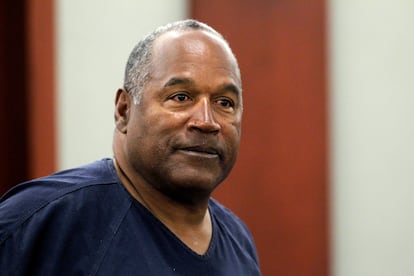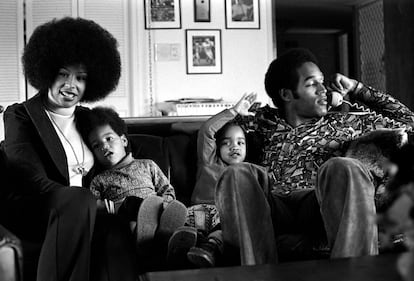O. J. Simpson’s inheritance: Four children, a legal process and a $114 million debt he owed relatives of the deceased
In 1997 the ex-athlete was sentenced in a civil lawsuit to pay $36 million to relatives of his ex-wife Nicole Brown and Ron Goldman, but they claim he never paid. Now one or more trials will determine what his assets are and to whom they will go


O. J. Simpson was one of the most controversial characters in the United States. The athlete and actor, who died on April 10 at the age of 76 due to cancer, was already a very popular face when, in June 1994, he became the most famous man in America after fleeing the police on a Los Angeles freeway. Simpson was the main suspect in the murders of his ex-wife, Nicole Brown, and her lover, a young waiter named Ron Goldman. After a high-profile trial that lasted almost a year, Simpson was acquitted, but his life turned around. He went first to Florida and then to Nevada, where he spent nine years in prison for a robbery, and finally settled in Las Vegas, where he lived discreetly until the end of his days. His relationship with his four children is not clear (a fifth child drowned as a baby), so nobody knows what will happen to his inheritance. That is, if he had anything left.
The trial of the century, as the criminal case was called, declared him innocent and Simpson avoided jail. But a civil lawsuit in 1997 sentenced him to pay $33.5 million in damages to the victims’ families; In 2006, after another lawsuit for not complying with that ruling, the penalty increased to $36 million. He never paid. During his 11 seasons in the NFL, the athlete amassed a large amount of money from his contract and his sponsors, although he also spent a lot of it on a luxurious lifestyle. When he separated from Nicole Brown in 1992, a court estimated that he had earnings and property worth $10.8 million and that he earned about $55,000 a month (about $122,000 with current inflation). He was also left with a pension and certain payments from the NFL. But the Goldman family lawyers assure that he never paid the damages, which should now be covered by his inheritance and which, in addition, has escalated to $114 million.
“He died without penance,” the lawyer representing Fred Goldman, father of the late Ron Goldman, stated about O. J. Simpson to People magazine. “He did not want to give a dime, a nickel to Fred, never, anything, never,” he explained, claiming that the new total amount was estimated in a review of the trial in 2022. According to The New York Post, Simpson had only paid the family $133,000 since the 1997 trial. In 2006 Simpson released a memoir, If I did it, and that same year Fred Goldman claimed that the football player was not paying his dues. A year later he declared bankruptcy and the judge decided to withdraw the rights to his autobiography and give them to Goldman. But it was, by far, insufficient.
On April 10th, our father, Orenthal James Simpson, succumbed to his battle with cancer.
— O.J. Simpson (@TheRealOJ32) April 11, 2024
He was surrounded by his children and grandchildren.
During this time of transition, his family asks that you please respect their wishes for privacy and grace.
-The Simpson Family
Now the will remains to be seen. Everything indicates that the legacy, whatever it may be, will fall to the four Simpson children, aged between 35 and 55, two from his first marriage to Marguerite Whitley and two others to Nicole Brown. They all lead lives far removed from the media spotlight. But regardless of what Simpson’s last will says (or whether there is one to begin with), there is another prior and mandatory legal step, the so-called probate process, which in the days after a person’s death recognizes their will and names the executor or representative who will administer the inheritance among the intended people. Whether it is needed or not depends on the laws of each state: for example, in Florida it is mandatory for those who have $75,000 or more; in California, it starts at $166,250; while in Nevada, where Simpson lived and died, it must begin if the person has $20,000 or some property. If the deceased had assets in different states, different processes can be opened. The entire process usually takes several months.
Once the case is in court is when the Goldman family lawyers might be able to get some money. In fact, they would be the first to get paid. In California (which is where Fred Goldman lives), Simpson’s debt, as it was generated by a homicide, has priority over other potential collectors. For this reason, as explained by the family lawyer, they are looking into the possibility of hiring specialized attorneys in the three states where the player lived: California, Florida and Nevada.

The distribution of assets will also depend on how O. J. Simpson disposed of them, because there are mechanisms (such as some trusts) that ensure that they reach the desired heirs and make it harder for creditors to collect. But if that were the case of the deceased athlete, the Goldmans could always file another lawsuit.
For now it remains unclear what assets remained to the name of the former NFL star, who even sold his prized Heisman Cup, a trophy awarded to the best college players of each season and which he won in 1968. He auctioned it in 1999 and got $255,000 (today it would be about $480,000, adjusted for inflation). According to some American sports outlets, if Simpson received a pension since he turned 55, it would be about $4,000 a month, but if he waited until he was 65, it would be up to $10,000. In addition, according to Page Six, he also charged certain amounts for signing autographs and recording videos. He even played golf with whoever paid him, and he always asked for cash.
Fred Goldman, father of the late Ron Goldman, said that money is not the most important thing. In fact, as early as 1997, Goldman stated that he would waive all compensation (which, in any case, he never collected) in exchange for a signed confession from Simpson. On news of his death, he told People: “This is just a reminder for us of how long Ron has been gone, how long we have missed him and nothing more than that. That is the only thing that is important today. It is the pain from then until now. There is nothing today that is more important than the loss of my son and the loss of Nicole. Nothing is more important than that.”
Sign up for our weekly newsletter to get more English-language news coverage from EL PAÍS USA Edition
Tu suscripción se está usando en otro dispositivo
¿Quieres añadir otro usuario a tu suscripción?
Si continúas leyendo en este dispositivo, no se podrá leer en el otro.
FlechaTu suscripción se está usando en otro dispositivo y solo puedes acceder a EL PAÍS desde un dispositivo a la vez.
Si quieres compartir tu cuenta, cambia tu suscripción a la modalidad Premium, así podrás añadir otro usuario. Cada uno accederá con su propia cuenta de email, lo que os permitirá personalizar vuestra experiencia en EL PAÍS.
¿Tienes una suscripción de empresa? Accede aquí para contratar más cuentas.
En el caso de no saber quién está usando tu cuenta, te recomendamos cambiar tu contraseña aquí.
Si decides continuar compartiendo tu cuenta, este mensaje se mostrará en tu dispositivo y en el de la otra persona que está usando tu cuenta de forma indefinida, afectando a tu experiencia de lectura. Puedes consultar aquí los términos y condiciones de la suscripción digital.








































